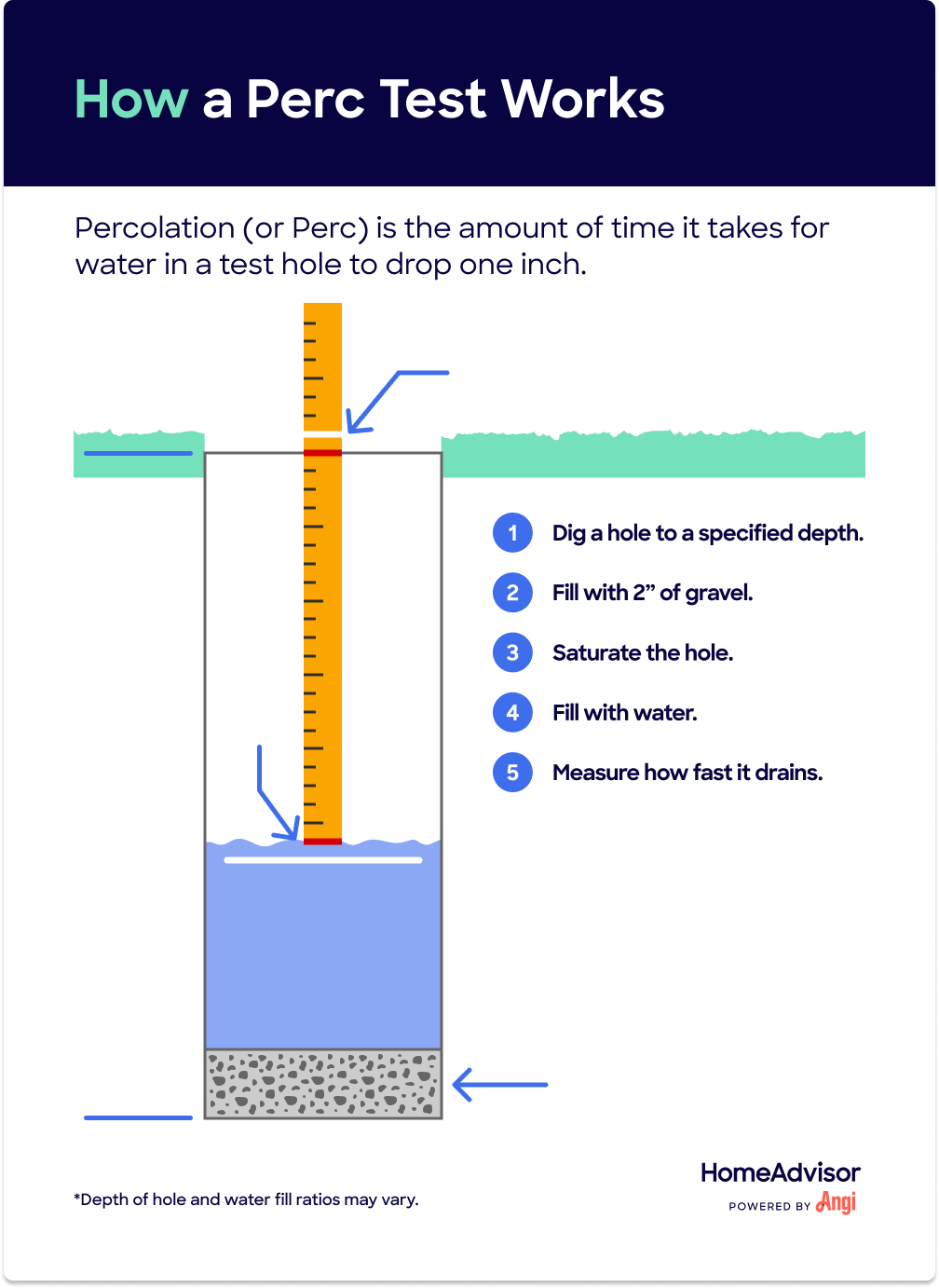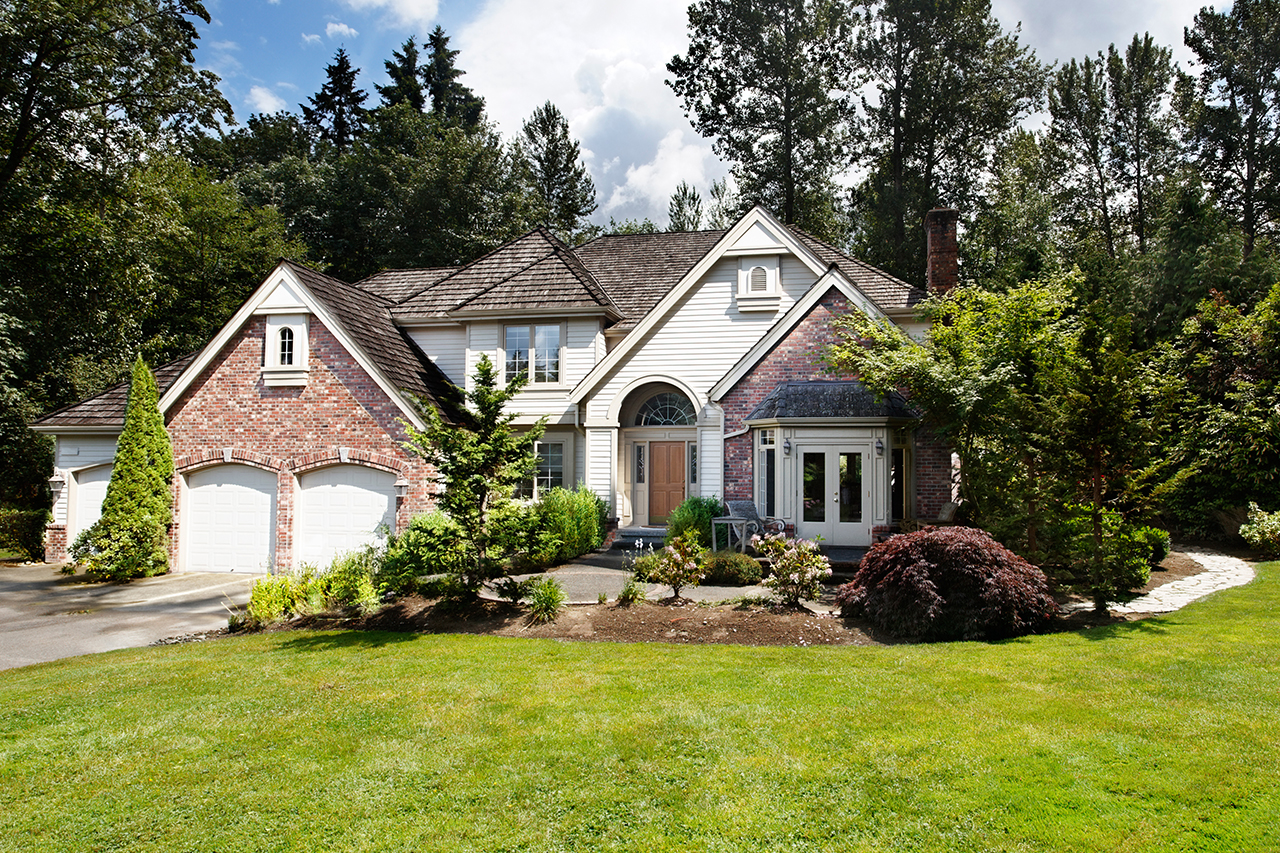How Much Does a Perc Test Cost?
Typical Range:
$750 - $1,850
Typical Range:
$750 - $1,850
Cost data is based on research by HomeAdvisor.
Updated November 7, 2022
Written by HomeAdvisor.If you’re considering buying a rural home or piece of land to build on that needs a septic system, you’ll need a perc test to determine if it’s suitable. Perc testing typically costs $750 to $1,850 or $1,300 on average. On the high end, you might pay as much as $3,000, depending on local regulation and the size of the leach field or infiltration basin needed. A basic assessment costs $150 to $300 for a hand-dug hole without specialized equipment.
| Average Cost | $1,300 |
| High Cost | $3,000 |
| Low Cost | $150 |
A perc test measures the drain rate of the ground around a potential home site, septic tank site, or infiltration basin. Basically, it measures the ground’s ability to absorb and filter water. A simple one involves digging a hole two to three feet deep and filling it with water, then timing how long it takes to drain; it usually takes one to six hours.
A failed perc test devalues the land or means it’s far more costly to develop for residential purposes. Official versions tend to use a backhoe and soil testing equipment to measure soil saturation and composition.
A perc test technician follows these general steps. They may use some variations depending on the area and what the test is for.
The technician:
Digs a hole or series of holes
Places two inches of gravel in the bottom of the hole - this step is soil composition dependent
Saturates the holes with water. This simulates a worst-case drainage scenario
Fills the hole with a predetermined depth of water
Measures the depth of water at regular intervals to determine drain rate
You need a perc test to determine if you can install a drain tile, infiltration basin, or septic system and leach field. A failed perc test means you either cannot use the land for that purpose or you’ll need to redig the land, creating more drainage. Without drainage, you’ll end up with standing sewage and water.
Using a perc test to determine a ground’s suitability for septic systems and leach fields costs $750 to $1,300 on average. Large parcels of land might need multiple assessments in multiple areas to find a good place to install one.
That price doesn’t include septic installation costs of $3,000 to $10,000.
A failed perc test means building a raised system or no system at all.
Most land purchases in undeveloped rural areas require this report before getting a permit.
About 25% of all U.S. homes use septic systems.
Perc tests for septic repairs cost the same for new installs, or $750 to $1,300 on average. That doesn’t include septic system repair costs of $500 to $2,500. You’ll need an assessment for any septic or leach field repairs or replacements. If it fails or shows slow drainage, you’ll likely need to replace all or portions of the field.
Perc tests for infiltration basins cost the same as for any other purpose or between $150 and $3,000. For extremely large areas, you might spend over $3,000, but typically that’s for agricultural or commercial purposes.
An infiltration basin, also known as a recharge basin or percolation pond, manages stormwater runoff. It prevents erosion and localized flooding. At its most basic, it’s a low spot created for rainwater to collect. It then drains slowly into the soil before it floods landscaping, homes, or roads.
Although fairly standard test methods exist everywhere, you may run into some other cost factors that increase the price, including:
Hiring a licensed professional or engineer. Some pros can perform perc tests without equipment or experience, but they likely won’t qualify for a building permit.
Using heavy equipment. Large equipment means fuel, an operator, and transportation to the site, all increasing the price.
Accessing the site. With heavy equipment, like an excavator, site access can increase the time needed to set up and do the test.
Regional pricing differences. Cost depends heavily on your area and state.
State, city, and county regulations vary widely from place to place. In some places, you may only need an informal test with a shovel, bucket, and a timer with only one hole dug. In others, you’ll need a licensed professional with detailed records and heavy equipment with multiple holes.
Who performs the test? One location might require a licensed professional, while another lets the homeowner perform the test.
How many holes are required? Variations on how many holes per square foot range from every 50 feet to one per lot.
What do the test results cover? Some require detailed soil composition reports and drain results, while others only need drain times.
Where are you digging? Regulations can vary between the city, county, and state
Due to the wide local variations in regulation, you’ll always want to hire a professional or at least contact your local code enforcement agency.
Your property’s location and accessibility help determine actual prices. A remote property 60 miles from the nearest town with difficult accessibility costs far more than a developed subdivision of a town.
Distance: A pro often charges more the farther they must go to cover fuel and travel time. The actual increase depends on the company.
Accessibility: You’ll pay more for hard-to-access land with little or no developed road access.
Location restrictions: You’ll need to make sure you’re following guidelines from the building code enforcement agency that has jurisdiction over your land.
The size of land you plan to use as a drain field determines how many holes you’ll have to dig. However, each state regulates the type and amount of testing you need and who can do the testing. Regulations on depth, soil type, and design of septic systems vary widely from location to location, so always check with your local building code enforcement office, or better yet, hire a local professional.
| Land Size | Number Of Holes Needed | Average Cost |
|---|---|---|
| 1/4 Acre | 1 – 4 | $150 – $1,000 |
| 1/2 Acre | 1 – 8 | $150 – $1,750 |
| 3/4 Acre | 2 – 12 | $300 – $2,300 |
| 1 Acre | 3 – 17 | $450 – $3,000 |
You’ll need to consider what you’re using the land for:
Septic system: Heavily regulated by location. You’ll need to check with a local pro to understand what’s needed and what it will cost.
Drainage: Simply installing drainage for water runoff into an infiltration system or basin usually requires less testing.
Commercial and agricultural: This’ll vary quite a bit depending on the local regulations. Agriculture and commercial applications often have stricter regulations and codes to follow.
If you understand the process, it’s something you may want to screen on your own. You’ll need a shovel, some water, and a stopwatch. However, the difference between a failed and passed assessment might mean a difference of thousands of dollars in a land’s value.
DIY work doesn’t always count as an official report. Some local regulations require a licensed professional. Official assessments tend to use a backhoe and dig deeper into the ground while using technical soil testing equipment. For land sales that require an official assessment by a professional, you’ll need to hire a pro. Find a local perc test professional.
A perc test measures the drain rate of the ground around a potential home site, septic tank site, or infiltration basin. A simple one involves how long it takes water to drain from a specifically sized hole. Official versions tend to use a backhoe and soil testing equipment to measure saturation and composition.
A perc test takes anywhere from one to six hours, depending on the size of the land and soil composition. Factor in travel time, site survey, determine testing needs, prepare the site, execute the test, and return travel. The entire process can take half a day to a full day to complete.
Geotechnical testing costs $1,000 to $5,000. You’ll only need this for new home builds since a perc test is only a small part of a complete survey. These reports look at a wide range of physical properties of the land. You don’t need this full report for septic, leach fields, or infiltration
Testing for soil contamination costs $600 on average. Perc tests don’t do this, but you may want to get it done if your leach field or septic is close to your groundwater. You may also want to get this done as a complete package deal before building a home or installing a septic system.
Failing a perc test means the drain rate of the water is too slow. When this happens, it means the ground cannot drain the water or wastewater needed for a basin or a leach field. The land is then considered undevelopable, or you’ll need to install a mounded, alternative, or above-ground septic system.
You can do perc tests in the winter in certain locations. The climate, soil composition, and frost line all play a large role in whether you can do a test or not in the winter months. Most locations have a guide to when you can or cannot perform the test. Contact a perc test professional to find out about your area.

